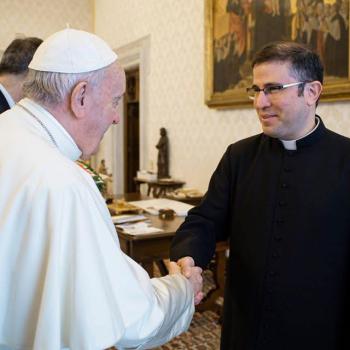Lectionary Reflections
Isaiah 42:1-9
Baptism of the Lord
First Sunday after Epiphany
January 12, 2014
Let's begin by being honest: we hardly have a clue about what happened to the infant Jesus in his tiny village of Nazareth. The church has made all manner of commemorations of events it can know nothing about. Yet, it is not altogether unfitting that we should celebrate the baptism of Jesus as a way of reminding ourselves that he was a human baby after all, and that he may have participated in rituals that we still celebrate today.
However, with the help of Isaiah we can radically deepen our appreciation and understanding of what this baby will do in his life. Or perhaps better and more accurately stated, what his later followers understood that he had done in his life, because according to the prophet of Israel's exile, writing over five hundred years prior to Jesus' birth, Israel needed a servant in order to do the work of YHWH on the earth. Now, exactly who the servant is (Is. 40:1) has been the source of vast scholarly effort. I hardly have time to dip our toes into this vast academic ocean, but let me summarize my appropriation of this work by saying that I think Isaiah's servant is either Israel itself or some smaller portion of the nation. After all, in Isaiah 49:3, the second of the so-called "Servant Songs" of the prophet, he directly names the servant "Israel."
But perhaps the far more important question for us, well beyond that of the identity of the servant, is what the servant is called to do for the exilic people and just how he is called to do it. It is from the answers to those two questions that the early Christian community derived much of its convictions about the call and work of the one they came to call the Christ.
Even a cursory reading of the first few verses of Isaiah 42 makes it crystal clear that the main work of this servant will center on justice. Three times in the first four verses, the word "justice" rings out from Isaiah's poetry. The servant will "bring forth justice" in 42:1; he will "faithfully bring forth justice" in 42:3; he will "establish justice in the earth" in 42:4. This famous Hebrew word, mishpat, is nothing less than a hallmark of the prophets of Israel. All the four writing prophets of the 8th century B.C.E.—Amos, Hosea, Micah, and Isaiah—use this word at prominent places in their oracles. Perhaps most famously, Amos 5 describes with gleaming metaphor the need for justice to "roll down like waters," claiming that an evil Israel needs nothing less than a purifying deluge of justice if it is ever to become at last the nation that YHWH first intended it to be. Likewise, this later Isaiah predicts that the unnamed servant of YHWH will make it his primary business to bring forth and establish justice in the earth.
Justice is the chief sign of a nation blessed by YHWH. In such a nation all people have equal access to the goods and services of that place; all people know inherently that their primary responsibility and goal is the welfare, the shalom, of all and each of their neighbors; all people of such a nation know that when any member suffers, all suffer, too. When the early Christians identified Jesus with Isaiah's servant, they implied, whether they knew it or not, that Jesus' primary goal in his earthly ministry was to bring justice to the nations and to root it deeply into the soil of the world.
And such justice-bringing is made plain in Isaiah 42:6-7, when the prophet sings that the servant will "be strengthened and will be offered to the people as a covenant, a light to the nations to open blind eyes, to free prisoners from their dungeons, those imprisoned in darkness." The early Christian believers surely remembered this song when they recalled Jesus' first sermon in his hometown of Nazareth, how he read from the scroll of Isaiah 61, a place in the text that reiterates this call for the healing of the blind, the opening of deaf ears, and the freeing of prisoners (see Luke 4). Of course, they knew of the stories of Jesus' ministry when he in fact cured the deaf and blind. Yet, when Isaiah announces that the servant of YHWH will be a light for the blind, he surely means that the blindness of injustice, an injustice that leads to the imprisonment of so many in darkness, will at last be illuminated and removed in order that the world may live at last in the light of justice, as much as he may mean that actual blind persons will regain their sight due to the work of the servant.
But the second question needs an answer, too; just how is the servant to bring this justice to the earth? Here the answer is a surprising one, yet a very famous one for all its surprise. "He will not shout out or raise his voice, demanding to be heard in public. A damaged reed he will not break, nor a dimming fire he will not extinguish," yet, "he will not faint or be crushed until he has established justice in the earth and the farthest reaches of the earth wait for his Torah" (Is. 42:3-4). This servant will work to bring justice inexorably, certainly, assuredly, without fail, but he will do it quietly, unobtrusively, unassumingly. We will hardly know that he is at work at all! That old and finally nasty cliché, "You can't make omelets without breaking eggs," simply does not apply to the servant of YHWH. Justice will come, but it will come in ways that we rarely can know or appreciate.





